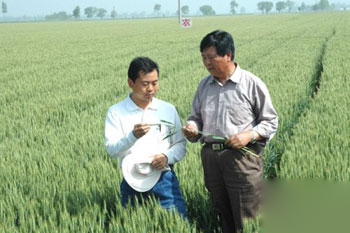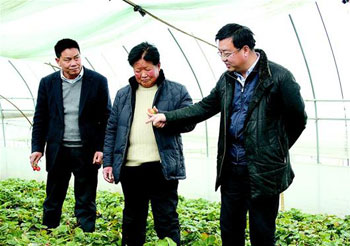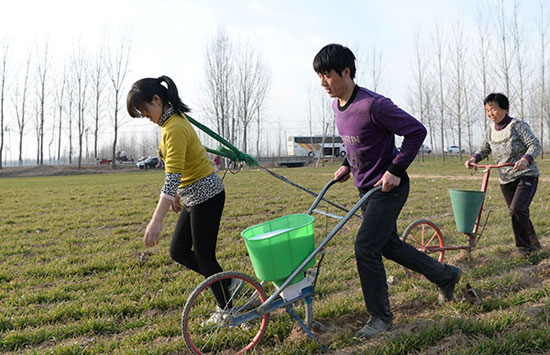A Memory of Characteristics of Wheat Breeding for Half a Century by Wang Hui
Original title: breeding expert Wang Hui: half a century watching the cultivation of wheat fields, "breeding Dream"
In 1995, his Xinong 84G6 wheat variety was selected and won the second prize for scientific and technological progress in Shaanxi Province. In 1999, his Xinong 1376 wheat variety was selected and won the first prize for scientific and technological progress in Shaanxi Province. In 2012, he won the "Shaanxi Science and Technology highest Achievement Award". In November 2015, he won the title of "2015 moved Shaanxi people"....
Now he is an old man in his twenties, but he is still ploughing the wheat fields and devoting himself to his research. The excellent breeding results obtained from half a century of hard work have not only made outstanding contributions to the country's food security, but also brought tangible well-being for the people.
He is Wang Hui, a famous breeding expert in China and a professor at Northwest University of Agriculture and Forestry.

In May 2010, Wang Hui (right) and his team assistant were checking the wheat seedling situation. Wang Hui provides pictures
In the face of the reporter, he is simple and sincere, "I want to be worthy of these honors, although old, as long as my body allows, I still want to insist, can do this thing."
Dreams take root in youth
At that time, the dream of most young people was to be admitted to college. In 1964, Wang Hui was admitted to Northwest Agricultural College. "after three years of natural disasters, we know that farmers are hungry, so Xuenong comes from the heart." Concerned about the food and clothing of the villagers, Wang Hui did not hesitate to choose the major of agricultural science.
During his time in college, Wang Hui especially cherished learning opportunities and went out early and came back late every day. Students majoring in agriculture have to face production in the future, in addition to learning theoretical knowledge, the study of production technology at the grass-roots level is also essential. In 1968, after graduating from university, Wang Hui entered the army farm for training and went through an arduous learning process, but the harvest was also fruitful. In this period of practical training, Wang Hui has a basic study and mastery of practical operations such as cultivation, breeding and field management, which has laid a solid foundation for future wheat breeding research.
Take love as the starting point, wash away the hardships of scientific research with the joy of harvest
In 1987, Wang Hui was transferred to the breeding teaching and research group to engage in teaching and part-time scientific research. He started breeding research in the school's two mu breeding teaching experimental field. At the beginning, there was no funding for the experiment, so I used my own salary to fill it. When there is not enough manpower, they call their families to serve as free labor. Soil preparation, fertilization, rowing, zoning and layout experiments are conducted every September, sowing in October, field observation and recording, disease resistance identification, pollination hybridization and field management in winter and spring, harvest, drying, indoor seed selection, test summary, test arrangement in summer. In this way, day after day, year after year, Wang Hui began his field breeding career full of hardship and sweat.
This has been going on for more than ten years from the beginning. In the wheat field, he is the most simple old farmer, dripping sweat into the soil and merging with the wheat field in the four seasons into a picture of hard work of sowing or ploughing or harvesting. In the laboratory in the evening, he was the most dedicated scientific research expert, reviewing, recording and collating the data observed in the wheat fields during the day, and the agronomic characteristics of each wheat material, the speed of development, and so on.
Watching during the day and summing up at night to form an impression in his mind is a habit that Wang Hui has persisted for many years. "if the breeding work can't do this, it doesn't matter just by writing it down in the book. In the end, the record and the person are separated. " That's what Wang Hui said.
In October 2012, Wang Hui sowed in autumn. Wang Hui provides pictures
If decades of hard work in the fields and painstaking research are the key factors for Wang Hui's success, then loving the cause of wheat breeding is the starting point. From his simple and simple dream of solving the problem of food and clothing for the villagers, to successfully developing many excellent wheat varieties and bringing real benefits to the people, he always cared about the people and never felt that he was making any dedication and sacrifice. Everything was taken for granted, and for him, the greatest feedback was tantamount to seeing a bumper harvest. "in the vast wheat fields of Xinong 979, the joy of seeing the farmers' bumper harvest is like the breeze blowing through the wheat waves in the golden autumn, and the ease and joy of that mood can wash away all tiredness and hardship," says Wang Hui.
Out of the wheat field laboratory, in order to bring the excellent varieties to the public and turn the results of scientific research into real productive forces, he is also one of the most painstaking travelers, leaving his footprints in Shaanxi, Henan, Anhui, and Jiangsu.
Wang Hui said: "although breeding is relatively hard, once the breed is bred, the heart is very happy to see the contribution to society, there are bitterness and happiness, but I think more is still sweet." In the bitterness and sweetness, a variety was born one after another. Since the birth of his first wheat variety "Xinong 84G6" in 1991, there have been a total of 11 wheat varieties, including Xinong 1376, Xinong 2611 and Xinong 2611, which have passed the national examination, covering an area of more than 150 million mu, increasing wheat income by more than 4 billion kg, and increasing output value by about 9 billion yuan.
In November 2015, Wang Hui (second from left) and the team inspected the emergence of wheat seedlings. Wang Hui provides pictures
Don't forget to inherit the dream of breeding from generation to generation
An old man who is in his twilight years could have retired with success and enjoyed his leisure. But Wang Hui never stopped and never wanted to stop. "breeding is a never-ending process of realizing a dream," he said. I also want to contribute more and better varieties to the society through my own efforts. "
He is concerned about inheritance. "I learned a lot from the older breeders in the local base and my mentor, Academician Zhao Hongzhang." Therefore, I also hope to pass on some of my unique views on breeding, especially practical experience, to young people engaged in breeding, so that they can grow up as soon as possible and play their due role as soon as possible. we should also pass on the breeding feelings of the older generation. "
For young people engaged in wheat breeding, Wang Hui stressed that wheat breeding should pay attention not only to experiments, but also to field practice. "breeding is like taking care of a child," he said. "you can't understand a child's temperament without touching the child. The same is true of wheat. Only by observing and recording it often can you know what is wrong with this material and how to improve it. "
He also stressed the need to conduct more production surveys to understand production problems. "breeding is a job of exploring innovation," he said. Whether this innovation really meets the needs of agricultural production can only be determined through the verification of production practice. "
- Prev

Three generations of "Grain King" on why it is better to grow grain than to grow grain
Three generations of "Grain King" on why it is better to grow grain than to grow grain
- Next

Go home for the Spring Festival and help the family plow the fields.
Go home for the Spring Festival and help the family plow the fields.
Related
- A course of planting techniques and methods on how to grow carrots
- How to plant the latest tulips?
- Is it better to pick tea in the morning or in the afternoon? When is the best time for tea to be picked? what is the third or fifth tea?
- Launch Yuanxiao Happy combination Haocha + Tea Yuan healthy Taste
- Penghu Tourism "Fireworks 20 Parade with You"
- 2022 West Lake Happiness holds "Digital Revitalization Voucher" and draws iphone13 and laptop.
- Banqiao Fuzhou social houses are designed to change start-up combined with police elimination to create a safe and livable environment
- The convenient measure of "mechanical weeding" in Xinbei has been abused and the Agriculture Bureau has imposed heavy penalties on the illegal land consolidation.
- Changgeng University Joins Hands with Four Memory Factories to Rescue Memory Talent Shortage
- The list of Taiwan's top 100 MVP managers is listed by the Director-General of the Farmers' Association of Sanxia District.

